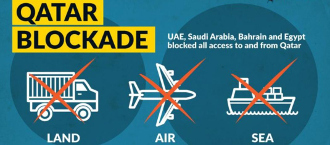Faced with embarrassing reports of the United Arab Emirates having hacked Qatari media, and the looming threat of lawsuit, the Saudi-led blockading states are increasingly on their heels in the crisis, and have today replaced their 13 demands for Qatar with “six principles.”
 The principles are broader (and more vague) than the specific demands, but pared away some particularly onerous parts. Gone are demands for Qatar to close all diplomatic facilities in Iran, gone is the demand for a fine, and gone is the demand that Qatar expel Turkey from their military base.
The principles are broader (and more vague) than the specific demands, but pared away some particularly onerous parts. Gone are demands for Qatar to close all diplomatic facilities in Iran, gone is the demand for a fine, and gone is the demand that Qatar expel Turkey from their military base.
Indeed, the six principles heavily boil down to just 3 of the previous demands. They want Qatar to commit to not providing “havens” for extremist groups, they want full endorsement of the leaked GCC documents, which mostly boils down to supporting other GCC states’ governments and the Egyptian junta. Everything else could be summarized as broadly muzzling al-Jazeera.
That’s of course been the long-standing goal of the blockading states, and all the language about “provocations” and interference with internal affairs are none-too-subtle code for bringing al-Jazeera in line with the rest of the GCC’s heavily censored media outlets.
Officials have even backed away from insisting al-Jazeera has to be closed outright, suggesting they’ll settle for “reforms,” which is to say ending their editorial freedom and penchant for allowing opposition figures on to present alternative viewpoints.
The blockading states appear to be betting that the watered down, more vague demands will allow Qatar to end the scandal while both sides save face about being seen to fully capitulate. Qatari officials, however, have previously been adamant that they aren’t going to sacrifice their sovereignty, and this is heavily related to demands to censor al-Jazeera to placate the region.


